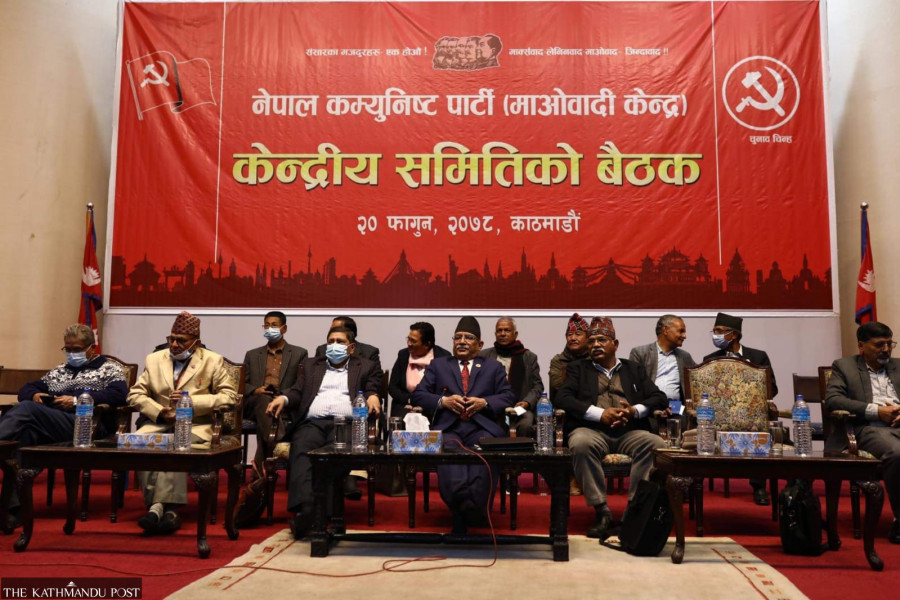Politics
Dahal tells party’s top meeting MCC endorsement was unavoidable
Narayan Kaji terms party decision to back the US compact tantamount to surrender.
Tika R Pradhan
Expressing serious reservations over the Maoist Centre’s decision to endorse the Millennium Challenge Corporation compact with an interpretative declaration, some of its leaders including Narayan Kaji Shrestha have presented differing views at the party’s Central Committee meeting that commenced on Friday.
When eight fringe communist parties including the Rastriya Janamorcha, which was in the ruling coalition until recently, were protesting against the MCC compact in the Capital, CPN (Maoist Centre) Chairman Pushpa Kamal Dahal was defending his move at his party’s meeting after playing a key role to endorse the US compact. Janamorcha left the coalition after the ruling parties earlier this week endorsed the compact with an interpretative declaration.
Dahal, who was re-elected party chair from the eighth national convention that concluded on January 2, is facing a hard time convincing his party members that endorsing the US compact was the right decision.
Just as he has been using the refrain of “peace process is in danger”, he resorted to the same technique once again to defend his decision to ratify the compact on Friday.
“If it had not been endorsed with revisions through the interpretative declaration, the MCC compact would have been passed in the original form,” a leader quoted Dahal as telling the meeting. “There was no alternative to this option. Otherwise, the issue would not only break the ruling coalition but also derail the peace process, which is yet to conclude.”
Dahal, according to leaders, said there were ploys to remove the Maoist party from the government. In that situation, his opponents would next target the Speaker and unseat him. If the conspirators succeeded in their plans, the party could face defeat in the elections and more Maoist leaders would come under attack on various pretexts.
“They [opponents including the UML] had plans to frame some businessmen who are close to me for money laundering,” a leader quoted Dahal as saying at the meeting. “Thousands of cases against our friends are still in various courts.”
Dahal, according to leaders, tried his best to convince the central members about his compulsion to endorse the MCC compact. He also told the central committee members that since Prime Minister Sher Bahadur Deuba was even ready to hand over the prime ministership to KP Sharma Oli to ensure the compact’s ratification without amendment, parties in the coalition decided to pass it with the interpretative declaration.
But Dahal did not elaborate how a failure to endorse the compact would derail the peace process.
Dahal also said the endorsement of the MCC has not only saved the ruling coalition but also ensured its continuation until the elections.
“All misunderstandings among the coalition partners have vanished with the endorsement of the MCC. Now the coalition will continue until the polls,” a Central Member quoted Dahal as saying at the meeting. “If the MCC was not endorsed, there was a chance that regressive forces could resume their activities.”
And Maoist leaders, especially those close to him, seemed convinced by Dahal’s Friday statement.
“If the coalition breaks apart, the Congress and the UML will join hands and they could revive war-era cases against our leaders,” said Hemraj Bhandari, a Central Committee member. “Things could get worse for our party.”
But some other leaders claimed that the problem was with the top leaders who always wish to remain in power and they feel frustrated if they are not in power.
“Shrestha has termed Dahal’s move as a surrender to the parliamentary system and to power,” said a Central Committee member close to Shrestha. “We need to fight against the system but not surrender.”
The leader also argued that the MCC issue alone would not derail the peace process even if the compact had not been endorsed.
“It’s been more than 15 years since the Maoists signed the peace process and the process is not complete yet, but the MCC issue is just a few years old,” he said, asking not to be named. “So how can the MCC derail the peace process?”
Political analysts, however, have said Dahal on Friday was using his old tactic to emotionally blackmail party leaders by instilling fear in them.
“Dahal is attempting to prove that his agreement with imperialists is the right decision by instilling fear in the party leaders,” said Bishwo Bhakta Dulal, a political analyst and former Maoist leader. “Peace process is not only his issue now. It is a national issue.”
On the first day of the meeting, senior leader Shrestha presented his differing views on Chairman Pushpa Kamal Dahal’s report on contemporary issues including the MCC compact.
Shrestha, according to leaders, has said the decision to endorse the MCC compact was betrayal of the nation and it was wrong as it has posed the danger of Nepal becoming a political playground for powerful nations.
Central committee members will comment on the statements of the two leaders during the next meeting scheduled for Sunday, which will be held at a party venue in the Capital.
Although other leaders including Dev Prasad Gurung, Lilamani Pokhrel and Krishna Bahadur Mahara had also registered their differing views on the party's decision to endorse the MCC compact, they have agreed to toe the party’s official line. But the Shrestha faction’s next move is still unclear.
Dahal has proposed the Central Committee should accept the party’s decision on MCC compact and train its focus on the upcoming local polls scheduled for May 13.
Insiders said the meeting could continue for a few more days.
The agenda of the meeting also includes filling the remaining Central Committee vacancies, forming the politburo and Standing Committee besides electing office bearers, and the local elections.




 21.12°C Kathmandu
21.12°C Kathmandu















